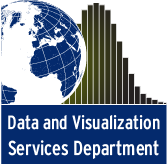 The fall of 2014 marks the completion of the first five years of the libraries’ Data and GIS Services Department. In 2009, when Mark Thomas and I formed the department, the name accurately reflected our staffing and services as Mark focused on GIS-related issues and I focused on data-related issues. As an increasing number of scholars have embraced data-driven research over the last five years , our services and staff have grown to support an increasingly diverse set of research needs at Duke.
The fall of 2014 marks the completion of the first five years of the libraries’ Data and GIS Services Department. In 2009, when Mark Thomas and I formed the department, the name accurately reflected our staffing and services as Mark focused on GIS-related issues and I focused on data-related issues. As an increasing number of scholars have embraced data-driven research over the last five years , our services and staff have grown to support an increasingly diverse set of research needs at Duke.
In 2010-2011 academic year, the Libraries launched services around data management and sharing plans in anticipation of new funding rules surrounding research data. In 2012, the library expanded data services in collaboration with OIT’s Research Computing to offer one of the first data visualization consulting positions in the country. In 2013 and 2014, we expanded services and staff to include consultations on research computing and big data.
At this year’s Data and GIS Services annual retreat, we decided that the time has come to change the name of the department to reflect the broader range of staff and consulting services available. While we continue to support our traditional dimensions of data and GIS research, we intend to support a range of data needs across the following five themes:
Data and Visualization Services Themes
Data Sources
Get the data you need. Data and Visualization Services consultants can help you locate and license a diverse range of data sources. We also provide long term storage for Duke data collections through Duke’s institutional repository.
Data Storage and Management
Need help on a data management plan, want advice on archiving, or struggling with “big data” analytics? We are happy to consult!
Data Cleaning and Analysis
From Google Refine to the command line, we can help with data cleaning and analysis.
Mapping and GIS
Mapping and spatial analysis remain a core service for the data and visualization program.
Data Visualization
Our data visualization service can help with the most effective way to represent your data for both analysis and communication.
We appreciate the research community’s support as we’ve grown over the last five years. We look forward to working with you on a larger range of data challenges in the future!

